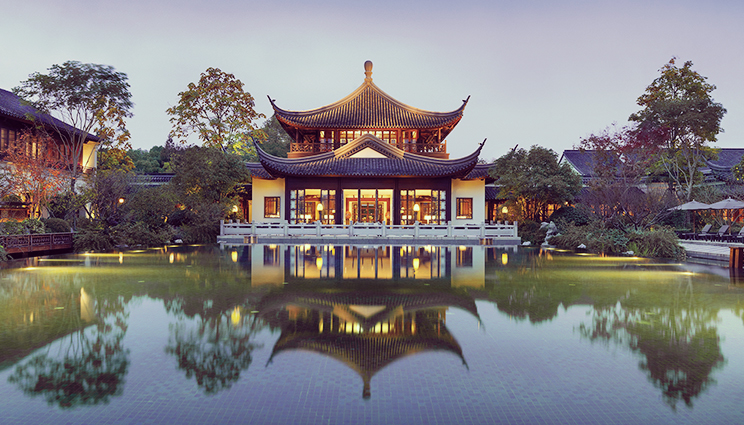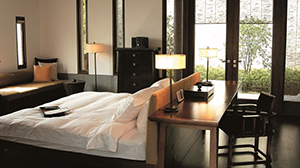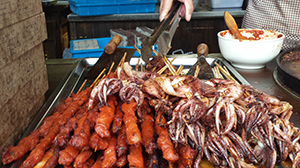
Go to Shanghai’s Yu Garden on a random Monday—not a public holiday, not even during summer break, just any regular Monday. Tell us what you see. We’re willing to wager that the five-acre attraction just west of the Bund is absolutely stuffed with visitors. Every way your neck turns, all you see are pavilions erected in the 16th century and throngs of tourists taking pictures of those pavilions. Plan your visit here (or anywhere else in Shanghai, for that matter) as strategically as you like; you still won’t be able to avoid the glut of gawkers. With 24 million full-time residents and around eight million annual visitors, you can understand how every place is always so crowded. That can be stressful. Needless to say, when it’s time for Shanghai to kick back, it has to look elsewhere.
For the greater part of seven centuries, refuge has been found about 110 miles south in Hangzhou. Dubbed “The City of Heaven” for its physical beauty by famed 13th century traveler Marco Polo, Hangzhou (pronounced Hung-Joe) is a magical place that has a way of concealing its congestion. Somehow, even with more than eight million people, the city provides a literal and metaphoric breath of fresh air from Shanghai—even though the two towns are separated by just an hour-long bullet train ride. But even beyond the natural calm that comes from a visit to West Lake or a relaxing bike ride via the bike-sharing program, Hangzhou also offers traditional restaurants, dynamic accommodations and an itinerary full of sights and sounds that will delight anyone looking for a reprieve from the crowds.
Where to stay
We don’t want to paint Hangzhou out as the Portland, Oregon of the Far East—no, there are entirely too many buses and motorized bikes for that—but we will say that a conscious effort has been taken by authorities to improve the overall quality of life and provide a bit of green to counteract all the pollutant gray that has grown synonymous with China. And never is that effort more obvious than at Four Seasons Hotel Hangzhou at West Lake, an 81-room property (which includes three residential villas) that melds the outdoors with opulent interiors as well as anyone this side of the Yangtze River. From private terraces etched into the foliage to the infinity pool in the stately courtyard to the gondola ride available at check-in, this wondrous hotel works in harmony with Mother Nature.
The scene at Zhejiang Narada Grand Hotel doesn’t evoke quite the same lush imagery, but the setting does provide just the right set of amenities for corporate travelers (deluxe business rooms offer soaking tubs and other high-end touches) and a wonderful location near Yellow Dragon Stadium, one of the venues used during the 2007 FIFA Women’s World Cup.
Less than an hour’s drive from central Hangzhou in the Fuyang lake district is where you’ll find an altogether different experience at Fuchun Resort Hangzhou. Like a walk back to the simpler times of tea plantations and mule-drawn carts, this grand, Song Dynasty-esque estate puts a focus on rejuvenation and relaxation. Yes, soft lighting, copious usage of wood and stone, and one of the most spectacular waveless indoor swimming pools you’ll ever see help to set a mood. But it’s the long looks from your room, across the resort’s rolling hills and a world-class golf course, that truly inspire.
But while these three properties provide more than enough choices for visitors on a weekend break, the city has other options for you — doesn’t matter if you’re thinking more traditional (Amanfayun, Banyan Tree Hangzhou) or today (Sofitel Hangzhou Westlake, JW Marriott Hotel Hangzhou) for your stay. There’s even the newly built Pins De La Brume Hotel that somehow blends wading pools, mountain-dotted vistas and traditional tea services with flat-screen TVs and top-of-the-line toiletries to create an experience that Shanghai simply can’t offer.
What to do
When Hangzhou comes up in conversation, two things typically spring up: West Lake and green tea. Though you can certainly combine the two with a stop at any Starbucks surrounding the 2.51-square mile freshwater lake, it’s probably best to keep them separate. With the former, there is no particular time to go when there isn’t a tour group being led by a guide on a loud speaker. Knowing that, the lake, which was named a UNESCO World Heritage Site in 2011, still manages to offer tranquility and some tantalizing photo ops. Herons hover above. Lotus flowers float about. Pagodas seemingly surface between every tree branch. When night falls, Impression West Lake, a jaw-dropping light and theatrical production, shows the waters in a new way. Part Disney spectacle, part Shakespearean theater, the nightly display is a must-see for any guest.
As for the green tea, savvy sippers consider the varieties from Hangzhou to be the world’s finest. Longjing lovers hold a pilgrimage to Hangzhou in as high regard as an Elvis fan might for Graceland. Until you’ve seen the techniques used for picking, the intricate steps applied to leaf drying or the steadiness needed for final preparation, you may not fully appreciate what all has gone into your cup. At the Meijiawu Tea Plantation, the process is given the respect it deserves through tea tourism tours. Fields of Camellia sinensis bushes go as far as the eye can see. Field workers meticulously seek out a particular shade of green leaves. Tea masters dry the pickings by hand in massive cauldrons that get well over 200 degrees. By the time the charismatic Ping Mei gets to demonstrating the medicinal benefits of Longjing, you—yes, you, Mr. “Three cups of java a day”—will believe in the tea’s power as much as the rest of China has for hundreds of years.
But tea and West Lake aren’t Hangzhou’s only gravitating forces. The city also has an abundance of museums that touch on everything from cooking (Hangzhou Cuisine Museum) to cooling (China Fan Museum). Quirky as they might sound, all of these attractions offer some insight into a culture that prides itself on craftsmanship. The Fan Museum shares space in the Workmanship Demonstration Pavilion with other galleries dedicated to time-honored items such as umbrellas, knives and swords. In many instances, locals can be seen at work. You can even pay to sit beside potters or papermakers to try your hand at a souvenir. Spoiler alert: Your project probably won’t end up that great, so save your money for mementos at the market.
What to eat
If you’re staying at some of the aforementioned luxury hotels, you won’t have to wander far for fine cuisine. Chefs at Four Seasons’ Jin Sha (with dishes such as sautéed river shrimp and deep-fried Mandarin fish) and Fuchun’s Asian Corner (think menus featuring stir-fried prawns and beef with bell peppers) take pride in one-upping themselves at every meal. When you do step off hotel property, luckily, there are even more dining options that give Westerners a taste of Eastern culinary culture that goes well beyond green tea ice cream at McDonald’s.
Crystal Jade Garden, situated on the edge of West Lake, dishes out the swanky ambience while still delivering killer Cantonese/Shanghainese fare. Lingyin Temple, a Buddhist monastery that dates back to 328 AD, serves as the backdrop for Lingyin’s vegetarian restaurant, an establishment that sparkles with mushroom soups and tofu entrées shaped like grilled fish. And then there are local haunts such as Grandma’s Kitchen that should be sampled as well. With numerous outlets all around Hangzhou, you’d guess the place would feel cold and chain-y. On the contrary, sports murals on the wall and a delightful Longjing tea chicken on the menu speak to the restaurant’s individuality.
Still, like many metropolises in Asia, a street vending culture is alive and doing very well in Hangzhou. Venture to the popular Hefang Street or Xixi National Wetland Park for vendors peddling grilled pork, chicken on a stick and all sorts of roasted critters and crustaceans that would put a smile on Andrew Zimmern’s face. Another interesting food seen (and smelled!) along Hangzhou streets is stinky tofu. This unique “treat” lives up to its name by emitting a pungency that will deter most from ever enjoying its popcorn-like taste.



